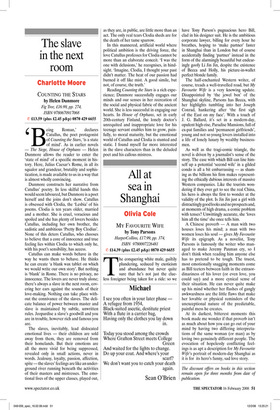The slave in the next room
Charlotte Moore
CoUNTING THE STARS by Helen Dunmore Fig Tree, £16.99, pp. 274, ISBN 9780670917068 ✆ £13.59 (plus £2.45 p&p) 0870 429 6655 Roman,’ declares Catullus, the poet protagonist of Counting the Stars, ‘is a state of mind’. As in earlier novels — The Siege, House of Orphans — Helen Dunmore allows the reader to enter the ‘state of mind’ of a specific moment in history. Here, Julius Caesar’s Rome, in all its squalor and grandeur, brutality and sophistication, is made available to us in a way that is almost wholly convincing.
Dunmore constructs her narrative from Catullus’ poetry. In less skilful hands this would seem laboured, but Dunmore is a poet herself and the joins don’t show. Catullus is obsessed with Clodia, the ‘Lesbia’ of his poems. Clodia is ten years older, married and a mother. She is cruel, voracious and spoiled and she has plenty of lovers besides Catullus, including her own brother, the sadistic and ambitious ‘Pretty Boy Clodius’. None of this deters Catullus, who chooses to believe that a core of innocence and true feeling lies within Clodia to which only he, with his poet’s sensibility, has access.
Catullus can make words behave in the way he wants them to behave. He thinks he can create ‘a blank wax tablet on which we would write our own story’. But nothing is ‘blank’ in Rome. There is no privacy, no innocence. The lovers are never truly alone; there’s always a slave in the next room, covering her ears against the sounds of their love-making. Nothing can take place without the connivance of the slaves. The delicate balance of power between master and slave is maintained by subtle, unwritten rules. Jeopardise a slave’s goodwill and you are in trouble, however rich and famous you are.
The slaves, inevitably, lead dislocated emotional lives — their children are sold away from them, they are removed from their homelands. But their emotions are all the more vivid for being suppressed, revealed only in small actions, never in words. Jealousy, loyalty, passion, affection, spite — the slaves’ feelings are like an underground river running beneath the activities of their masters and mistresses. The emotional lives of the upper classes, played out, as they are, in public, are little more than an act. The only real tears Clodia sheds are for the death of her tame sparrow.
In this mannered, artificial world where political ambition is the driving force, the love Catullus professes for Clodia cannot be more than an elaborate conceit. ‘I was the one with delusions,’ he recognises, in hindsight. ‘Imagine, Clodia, I thought your past didn’t matter. The heat of our passion had burned it off like mist. A good simile, but not, of course, the truth.’ Reading Counting the Stars is a rich experience; Dunmore successfully engages our minds and our senses in her recreation of the social and physical fabric of the ancient world. She is less successful in engaging our hearts. In House of Orphans, set in early 20th-century Finland, the lonely doctor’s unrequited and inappropriate love for his teenage servant enables him to grow, painfully, to moral maturity, but the emotional world of Catullus and Clodia is stunted and static. I found myself far more interested in the slave characters than in the deluded poet and his callous mistress.


















































































 Previous page
Previous page